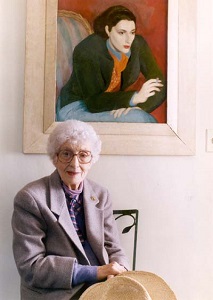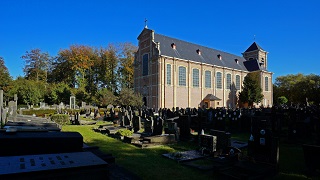De Amerikaanse dichteres en schrijfster May Sarton werd geboren op 3 mei 1912 in Wondelgem, België (vandaag een deel van de stad Gent). Haar ouders waren wetenscapshistoricus George Sarton en zijn vrouw, de Engelse kunstenares Mabel Eleanor Elwes. Toen de Duitse troepen België binnenvielen in 1914, vluchtte haar familie naar Ipswich, Engeland, waar de grootmoeder van moederskant woonde. Een jaar later verhuisden ze naar Boston, Massachusetts, waar haar vader aan de universiteit van Harvard ging werken. Sarton ging naar school in Cambridge, Massachusetts, en studeerde in 1929 af aan de Cambridge High and Latin School. Ze begon met theaterlessen in haar late tienerjaren, maar ging door met het schrijven van poëzie. Ze publiceerde haar eerste bundel “Encounter” in 1937. In 1945 ontmoette ze in Santa Fe, New Mexico, Judith “Judy” Matlack die de volgende dertien jaar haar partner was. Ze gingen uit elkaar in 1956, toen de vader van Sarton stierf en Sarton naar Nelson, New Hampshire verhuisde. “Honey in the Hive” (1988) gaat over hun relatie. In haar memoires “At Seventy” reflecteerde Sarton op de belangrijkheid van Judy in haar leven en hoe haar universalistische Unitaristische, opvoeding haar vormde. Sarton verhuisde later naar York, Maine. In 1990 kreeg ze aan een beroerte, waardoor haar concentratievermogen en schrijfvaardigheid ernstig verminderde. Na enkele maanden kon zemet de hulp van een bandrecorder haar laatste dagboeken, te beginnen met “Endgame”, vastleggen. Ze stierf op 16 juli 1995 aan borstkanker en ligt begraven op Nelson Cemetery, Nelson, New Hampshire. Ondanks de kwaliteit van enkele van haar vele romans en gedichten behoren haar dagboeken en memoires, met name “Plant Dreaming Deep”, “Journal of a Solitude” (1972-1973, vaak beschouwd als haar beste werk), “The House by the Sea” (1974-1976), “Recovering” (1978-1979) en “At Seventy” (1982-1983).
Uit: Journal of a Solitude
“November 9th
HOME AGAIN to more radiant skies, a moon so bright last night I couldn’t sleep. I found a huge box of bulbs; they have come at last. It is the eleventh hour as the ground will soon be frozen, but apparently a dock strike in Holland held them up. The lectures went well. Both audiences, in Dallas and in Shreveport, listened intently; so at least once I experienced that marvelous stillness when I know a poem has really landed and is being heard as it can be only before a large impersonal group, because then I can “give tongue” and make whatever meaning and music is there “happen.” Reading to one person, an intimate, I can never really let the poem out. I found the going hard at first because I felt depayse; after a long flight one is slightly out of balance, not really settled in, still living one’s way into the new atmosphere. And because, of course, it was in Texas more than ten years ago, on a lecture trip, that I was wakened at seven thirty A.M. with a long-distance call from Judy to say that my father had died of a heart attack in a few minutes, after turning back in the taxi that was taking him to the airport to give a lecture in Montreal. That memory and also the shadow of the Kennedy assassination were much in my thoughts. The psychological discomfort was acute at times. The women I met were kind, and apparently gentle and responsive. Then suddenly that steely look comes into their eyes, the real hatred of the Kennedys, still, after all the tragedies. And besides that, of course, the closed door in the mind when it comes to the race question. I know that it is there partly as a symptom of loss, the loss of a loving warmth between master and servant, the bewildering emergence of Black Power that seems to these people a betrayal of old loyalties and old graces. But how well one comes to understand in this atmosphere why many blacks have decided that all-out war is the only way to change anything. Most of this I had expected, but what upset me most was the selfishness; the perimeter was so personal and limited. Does nothing, no suffering outside it, ever break through, no need? The Kennedy assassination apparently has only closed the ring. I felt culture in its deepest sense, what civilizes people, as only a thin veneer, like the new houses which turn out to have a brick facade pasted onto some other material. And how incredible it was, in autumn, to swing past acres and acres of fancy French provincial, Spanish, or Tudor houses where not a leaf is allowed to rest on the immaculate lawns! So beautiful in a House and Garden sort of way, so empty of poetry. For poetry lives in places where people work in their gardens or let them go wild and do not leave it to impersonal firms of gardeners to plant and trim. Shreveport has far more charm, a livable town, where Dallas seems just plain inhuman, too rich, too new. A fifty-year-old building in Dallas looks antediluvian and “must be torn down.” I felt the women were starved, starved for a kind of reality that does not exist in Neiman Marcus fur coats, in changes of fashion, in redecorating, in travel to the “right places.” Under the polite small talk, one sensed nostalgia, the nostalgia of the bored child who does not know what he lacks, but knows he is being deprived of something essential to his well-being.”

May Sarton (3 mei 1912 – 16 juli 1995)


